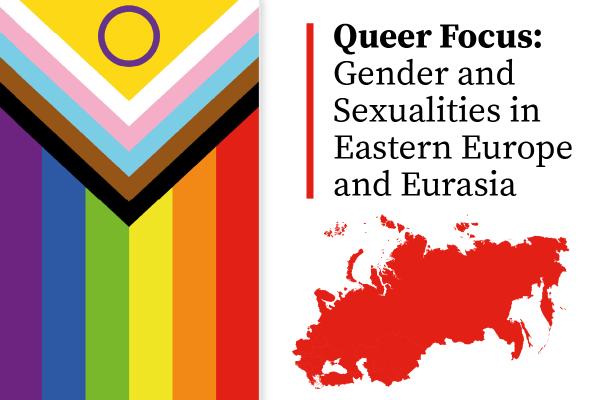
Many efforts have been made over the past several years to diversify Eastern European and Eurasian studies. This new spotlight surfaces research that has been conducted by many scholars for much longer, highlighting their commitment to telling stories and honoring perspectives of diverse and minority communities. Their work reveals that while there is no unified queer experience in the region, there is often a one-size-fits all state response to the reality of queer lives in many nations within the region. How can a queer-studies focus advance conversations about decolonization in East European and Eurasian Studies? To address this question, Queer Focus will have six virtual panels featuring speakers from various disciplines and institutions. Panelists and participants will explore how gendered regimes were constitutive of Russo-centric relationships of power, defining the region and how we study it, as we collectively grapple with what it means to re-examine our current research, teaching, and institutional practices.
Panel 6 of the series will examine the role and impact of queer activism within the region.
Speakers
Lyosha Gorshkov, Moderator, Director of LGBTQ+ Initiatives, Colgate University
Dr. Lyosha Gorshkov is originally from Russia. Lyosha holds a PhD in Political Science that Lyosha received in 2009 from Perm State University. Lyosha introduced queer studies to Russian political science, actively promoting LGBTIQA+ within Russian academia. In 2014, Lyosha was forced to leave Russia being persecuted as an openly queer professor and advocate for LGBTIQA+ rights. Lyosha was exiled to the Unites States. Settling in New York City, Lyosha has emerged as one of the vocal leaders and community organizers for the Russian-Speaking LGBTIQA+ immigrant community. Lyosha has served as the Co-President and, currently, as a Board Member at RUSA LGBTQ+, the Russian Speaking American LGBTIQA+ Association since 2015. Prior to coming to Colgate, Lyosha served as tenured faculty at Perm State University (Russia); Care Manager at the Alliance for Positive Change (New York); visiting scholar at Indiana University (Bloomington); and Assistant Director of Pride Center and Women's Center at Slippery Rock University (Pennsylvania).
Shota Kincha, Journalist, OC Media
Shota Kincha is a Georgian journalist covering Georgia-related topics at OC Media. He is interested in nationalism, far-right, and gender and queer issues, and on the wider Eastern and Central Europe region.
Zhanar Sekerbayeva, Co-Founder, Kazakhstan’s LGBTQ Feminist Initiative “Feminita”
Zhanar Sekerbayeva is a co-founder of the Kazakhstan Feminist Initiative “Feminita”. She is a feminist, powerlifter and poet. In her work she aims at expanding the concept of ‘gender’ in the general public discourse through activism by mainstreaming questions of gender identity in the academia. She graduated Summa Cum Laude from the ‘Gumilev’ Eurasian National University in 2005, as well as from the ‘Lomonosov’ Moscow State University in 2009. In 2014 she enrolled at the European Humanities University (Lithuania) MA program in Sociology with a focus on gender and culture and completed study at the University of Tsukuba, Japan towards a PhD degree. Her doctoral dissertation focuses on the processes of regulating identities and “normalization” of transgender people in Kazakhstan, where she is interested in understanding how the gatekeeping practices of legal professionals may or may not be shaping the gender identities of transgender individuals as they seek legal affirmation. Her latest publication is a chapter in the “Women, Sport and Exercise in the Asia-Pacific Region: Domination, Resistance, Accommodation” edited by Molnar G., Sara N. Amin, Yoko Kanemasu, as part of the Routledge Research in Sports, Culture and Society series.
Tatsiana Shchurko, Post-Doctoral Scholar, Department of Women's, Gender and Sexuality Studies, The Ohio State University
Tatsiana Shchurko is a researcher and queer feminist activist from Belarus committed to transnational and intersectional feminist theorizing and activism. Her work is situated within anti-colonial feminist theorizing with a focus on multiple imperialisms within and between Europe, Eurasia, and the United States. She has been awarded a 2023 American Council of Learned Societies Fellowship. Her current research project focuses on critical genealogies of transnational feminism, specifically centering the connections between Black women’s transnational activism and Eurasian knowledge production. Specifically, her book project explores Black feminist solidarities in Eurasia, investigating how these interactions resonate with or may contribute to contemporary anti-imperialist feminist movements. She has taught a range of courses, including Gender, Sex, and Power; Black Women Writers; Health and Inequality; Sexualities and Citizenship; and Regulating Bodies: Global Sexual Economies.
Mohira Suyarkulova, Associate Professor, Department of Psychology, American University of Central Asia
Mohira Suyarkulova is a queer feminist scholar, teacher and activist living and working in Bishkek, Kyrgyzstan. She has led participatory action studies on lives of LGBTQ+ people in Kyrgyzstan as well as researched queer activism in South Caucasus and Central Asia. She teaches courses on feminism, sexuality, activism, ethics and diversity and art at AUCA. Mohira also engages in activist artistic practices and community organising.
Sponsorship
Additional financial support has been provided by:
Center for Russian, East European, and Eurasian Studies, University of Kansas
Center for Russian, East European, and Eurasian Studies, University of Michigan
Center for Russian, East European, and Eurasian Studies, The University of Texas at Austin
Center for Slavic, Eurasian and East European Studies, UNC-Chapel Hill
Inner Asian and Uralic National Resource Center, Indiana University, Bloomington
Institute for European, Russian, and Eurasian Studies, The George Washington University
Institute of Slavic, East European, and Eurasian Studies, University of California, Berkeley
Melikian Center for Russian, Eurasian, and Eastern European Studies, Arizona State University
Robert F. Byrnes Russian and East European Institute, Indiana University, Bloomington
Accessibility
The Davis Center for Russian and Eurasian Studies at Harvard University encourages persons with disabilities to participate in its programs and activities. If you anticipate needing any type of accommodation or have questions about the physical access provided, please contact us at 617-495-4037 or daviscenter@fas.harvard.edu in advance of your participation or visit. Requests for Sign Language interpreters and/or CART providers should be made at least two weeks in advance if possible. Please note that the Davis Center will make every effort to secure services but that services are subject to availability.
